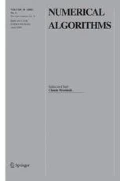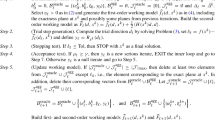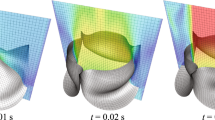Abstract
The Method of Fundamental Solutions (MFS) is a boundary-type meshless method for the solution of certain elliptic boundary value problems. In this work, we propose an efficient algorithm for the linear least-squares version of the MFS, when applied to the Dirichlet problem for certain second order elliptic equations in a disk. Various aspects of the method are discussed and a comparison with the standard MFS is carried out. Numerical results are presented.
Similar content being viewed by others
References
K. Amano, A charge simulation method for numerical conformal mapping onto circular and radial slit domains, SIAM J. Sci. Comput. 19 (1998) 1169–1187.
M.D. Buhmann, Radial Basis Functions: Theory and Implementations, Cambridge Monographs on Applied and Computational Mathematics (Cambridge Univ. Press, Cambridge, 2003).
P.J. Davis, Circulant Matrices (Wiley, New York, 1979).
G. Fairweather and A. Karageorghis, The method of fundamental solutions for elliptic boundary value problems, Adv. Comput. Math. 9 (1998) 69–95.
G. Fairweather, A. Karageorghis and P.A. Martin, The method of fundamental solutions for scattering and radiation problems, Engrg. Anal. Boundary Elements 27 (2003) 759–769.
M.A. Golberg and C.S. Chen, Discrete Projection Methods for Integral Equations (Computational Mechanics, Southampton, 1996).
M.A. Golberg and C.S. Chen, The method of fundamental solutions for potential, Helmholtz and diffusion problems, in: Boundary Integral Methods and Mathematical Aspects, ed. M.A. Golberg (WIT Press/Computational Mechanics, Boston, 1999) pp. 103–176.
M. Katsurada, The collocation points of the fundamental solution method for the potential problem, Comput. Math. Appl. 31 (1996) 123–137.
J.A. Kolodziej, Review of applications of the boundary collocation methods in mechanics of continuous media, Solid Mech. Arch. 12 (1987) 187–231.
J.A. Kolodziej, Applications of the Boundary Collocation Method in Applied Mechanics (in Polish) (Wydawnictwo Politechniki Poznanskiej, Poznan, 2001).
P.K. Kythe, Fundamental Solutions for Differential Operators and Applications (Birkhäuser, Boston, 1996).
P.W. Partridge, C.A. Brebbia and L.C. Wrobel, The Dual Reciprocity Boundary Element Method, International Series on Computational Engineering (Computational Mechanics, Southampton and Elsevier Applied Science, London, 1992).
P.A. Ramachandran, Method of fundamental solutions: singular value decomposition analysis, Commun. Numer. Methods Engrg. 18 (2002) 789–801.
Y.S. Smyrlis and A. Karageorghis, Some aspects of the method of fundamental solutions for certain harmonic problems, J. Sci. Comput. 16 (2001) 341–371.
Y.S. Smyrlis and A. Karageorghis, Numerical analysis of the MFS for certain harmonic problems, Technical Report TR/04/2003, Department of Mathematics and Statistics, University of Cyprus.
Author information
Authors and Affiliations
Rights and permissions
About this article
Cite this article
Smyrlis, YS., Karageorghis, A. A Linear Least-Squares MFS for Certain Elliptic Problems. Numerical Algorithms 35, 29–44 (2004). https://doi.org/10.1023/B:NUMA.0000016581.85429.8d
Issue Date:
DOI: https://doi.org/10.1023/B:NUMA.0000016581.85429.8d




